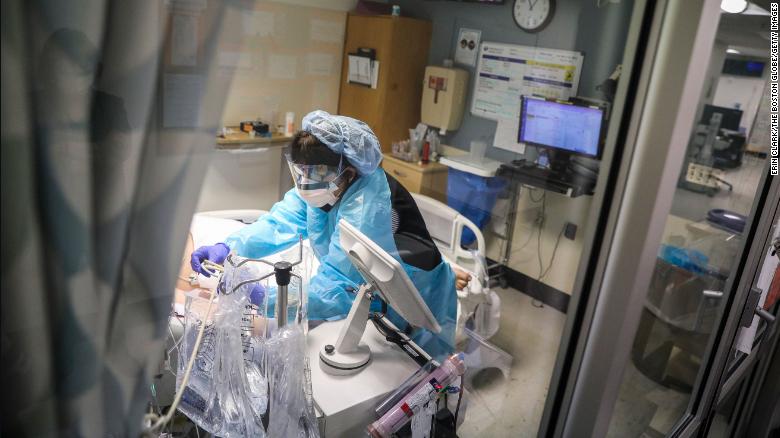CDC explain omicron difference in US and South Africa 1:09
(CNN) ––
The omicron question hung in the air like a bad smell, as I silenced the small group of fully vaccinated and boosted friends and family at my table.
"Why not get the omicron and get out of it at once? It's mild, right? And it can boost immunity?"
The fully vaccinated, booster dose, highly educated friend who asked was sincere.
In addition, he echoed the opinions expressed on many social platforms.
The idea of intentionally trying to get omicron "is all the rage," said Dr. Paul Offit, director of the Center for Vaccine Education at Children's Hospital of Philadelphia.
He included an exasperated sigh in his comment.
Minute by minute: the advance of the omicron variant and the coronavirus pandemic in the world
"It has spread like wildfire," agreed Dr. Robert Murphy, director of the Havey Institute for Global Health at Northwestern University Feinberg School of Medicine.
advertising
"And it is very widespread, coming from all kinds of people: the vaccinated, the people who have already received their booster and the anti-vaccines," he added. In that sense, he made a harsh warning: "You would have to be crazy to try to get infected with this.
It's like playing with dynamite. "
To be tested or not for covid-19?
The medical keys 2:05
In case this idea has crossed your mind, here are five reasons why you should not try to get an omicron on purpose.
1. Having a case of omicron is not a "bad flu"
Significant fever, body aches, swollen lymph nodes, sore throat and severe congestion are commonly reported symptoms, even in the mildest cases of the omicron variant, Murphy said.
Which leaves people weak for several days.
Do you have covid-19?
This is how you can treat the disease at home: from what to take to when to see a doctor
"People talk about omicron like it's a bad flu. It's not," Murphy insisted.
"It is a disease that can be fatal," he warned.
A recent study, which included more than a million people, published by the US Centers for Disease Control and Prevention (CDC), found that the risk of serious illness from Covid-19 was highest in vaccinated people 65 and older, people with weakened immune systems, or people who had at least one of the following health conditions: diabetes or chronic kidney, heart, lung, neurological, or liver disease.
Will a vaccine against the omicron variant be necessary?
1:17
Now, even people without underlying health problems can suffer from serious illness, Murphy warned.
"I have at this time a vaccinated and booster dose patient, over 65 years old with no underlying risk factors, who is in the hospital and having difficulties," he said.
It's true that if you catch the omicron variant of the coronavirus, as opposed to delta, "you're less likely to be hospitalized, less likely to go to the intensive care unit, less likely to need a ventilator, and less likely to die. And that's true for all age groups, "Offit said.
These are the symptoms caused by the omicron variant of the new coronavirus
"But that doesn't mean it can't be a serious illness," he quickly clarified.
"It's just less serious. But you don't have a 0% chance of dying. You should never want to get infected," he insisted.
2. You could suffer the effects of prolonged covid
Losing the sense of smell –– and therefore that of taste–– is one of the most common symptoms in mild cases of Covid-19.
Research shows that around 80% of people regain capacity in about a month.
But there are others that cannot smell or taste even after six months or more.
Even the unfortunate few may never regain those two senses.
The US grapples with a rise in infections and a shortage of covid-19 tests 1:54
As uncomfortable as it may be, it is just one of many health conditions that can linger for an extended time after a case of the new coronavirus.
Called "long covid," the phenomenon is characterized by such debilitating symptoms as shortness of breath, severe fatigue, fever, dizziness, mental confusion, diarrhea, palpitations, muscle and abdominal pain, mood swings, and trouble sleeping.
Severe forms of long-term covid can damage the lungs, heart, and kidneys.
Also affect your mental health.
Additionally, they may qualify as a disability under the Americans with Disabilities Act and other federal statutes.
Some symptoms that indicate that you already had covid-19
"We are still trying to understand protracted covid," Offit said.
"As we still do not fully understand it, I would not be so quick to want to contract an infection from a natural virus," he said.
"A natural virus is always called a wild-type virus. And there is a good reason for this: it is out of control," explained Offit.
"Never risk getting an infection from a natural virus."
3. With omicron you could infect children
Just over half of the children between the ages of 12 and 17 who are eligible for covid-19 vaccines, exactly 54%, have received the full schedule.
Only 23% of children ages 5 to 11 are vaccinated with their first dose, according to the CDC.
More children continue to be admitted to US hospitals by omicron 3:48
Booster doses, considered a key strategy in the fight against omicron, were only recently authorized for children 12 and under, following a CDC decision.
Hence, so far few children have received the third dose.
That means any risky behavior that could expose them to omicron, such as not wearing a mask, not following social distancing guidelines, or gathering with crowds, especially indoors, will potentially expose others who can then pass the virus on to their children.
Data from the American Academy of Pediatrics (AAP) show an upward trend in infections in children.
Which, in addition, far exceeds "the peak of past waves of the pandemic."
What activities are safe for children now that the omicron variant is spreading rapidly?
An expert explains it
"During the week ending January 6, more than 580,000 cases of covid-19 were reported in children," according to figures released Monday by the AAP.
"This figure represents a 78% increase over the 325,000 additional cases that were reported in the week ending December 30. And it almost triples the number of cases in the previous two weeks," the AAP added.
Typically, COVID-19 infections in children have been mild up to this point in the pandemic.
But the sheer magnitude of cases caused by the highly contagious omicron variant is sending children under 18 to hospitals in record numbers, according to CDC data.
"I would say the best way to keep those children safe is to vaccinate them when they are eligible and surround them with siblings and parents who also get vaccinated," CDC Director Dr. Rochelle Walensky said at a news conference Friday.
Covid-19 could increase the risk of diabetes in children 0:42
4. You will overburden the health system
By deliberately contracting any variant of SARS-CoV-2, which is the official name for the new coronavirus, "you will sustain the pandemic and strain the health care system," Murphy warned.
Over the weekend, nearly a quarter of the more than 5,000 hospitals reporting to the US Department of Health and Human Services (HHS) reported experiencing a "critical staff shortage." .
This is the highest number than at any other time in the pandemic, the data revealed.
Covid-19 hospitalizations in the US reach levels not seen since last winter
The staff shortage is expected to grow even further, as front-line healthcare workers become infected or must go through quarantines after being exposed to COVID-19.
Likewise, the shortage of medical personnel could not have come at a worse time: More than 138,000 people with Covid-19 were hospitalized in the United States as of Saturday, according to HHS.
Additionally, HHS data reports that ICUs across the country are more than 80% full.
Also that almost 30% of the beds are used to treat patients with covid-19.
Optional surgeries are being suspended and health care officials are concerned that the nation's health system will not be able to do its job.
A healthcare worker at UMass Memorial Medical Center treats a patient in the covid-19 intensive care unit in Worcester, Massachusetts.
"The health care system is not designed just to care for people with COVID-19. It is designed to care for children with appendicitis and people who have heart attacks and car accidents," said Dr. Ashish Jha, dean of Brown University School of Medicine and Public Health, to CNN this Sunday.
More than 100,000 hospitalized for covid-19 in the US 2:53
"And all of that is going to be much, much, more difficult because we have a large proportion of the population that is not vaccinated. Many high-risk people who are not vaccinated."
5. Don't challenge mother nature
Has it ever been a good idea to get a disease on purpose?
Those of a certain age will remember when parents used to throw "chicken pox parties" to expose their young children to an infected child.
Because chickenpox in adults is more serious, the idea was for your child to catch it early to "get over it."
In the US, states are struggling to keep up with an increase in COVID-19 hospitalizations and demand for testing.
"Oh that was a bad idea too," Offit said.
In fact, he told a story about an educational movie about vaccines that he made years ago, and the cameraman revealed that he had a sister who had taken her son to a chicken pox party.
Tragically, the boy died from the infection.
"Don't challenge mother nature," he said.
"She has been trying to kill us since we came out of the ocean to land."
Covid-19micron








